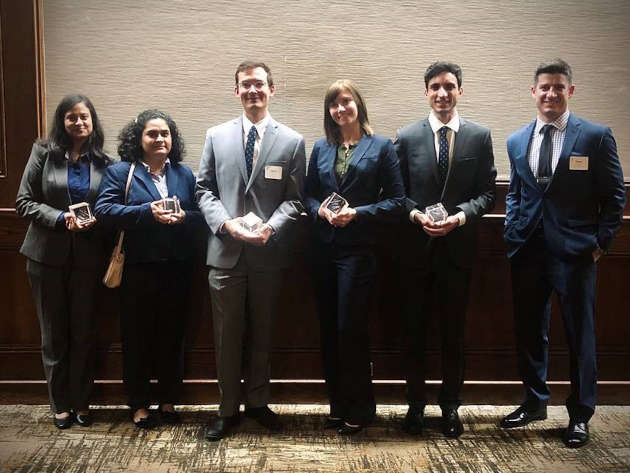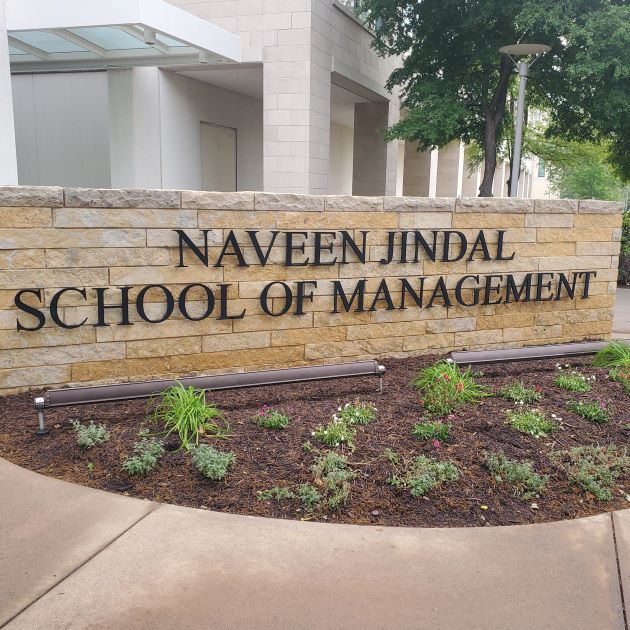
A team of Naveen Jindal School of Management graduate students recently won the case study competition of the North Texas chapter of the American College of Healthcare Executives. It was the fifth victory for JSOM in the annual event.
The winning team’s members earned a $3,000 cash award, along with individual trophies and one-year memberships in ACHE.
All five members of the first-place team are MBA students, and four of the five are dual-degree seekers. Fares Stanbouly is an MBA student. Avani Alla and Dheera Dammanna are also pursuing an MS in Business Analytics; and Adam Jurecki and Allison potter are also pursuing an MS in Healthcare Leadership and Management.
The Jindal School entered two teams in the competition for the first time this year, and the winners placed ahead of their fellow UT Dallas competitors as well as the University of North Texas Health Science Center, Texas State University and the UTHealth School of Public Health.
The Hospital as Community Activist
This year, participants offered solutions to an “anchor mission” project for UMass Memorial Health Care. The Democracy Collaborative, a community-development think tank in Washington, D.C., created the idea of an anchor mission, an effort to link the economic power and other resources of institutions such as colleges and hospitals to the communities in which they reside in order to help ensure the ongoing well-being of those communities.
JSOM team member Fares Stanbouly explained the winning strategy the JSOM team deployed at the Nov. 5 competition, which was held in Irving, Texas, in conjunction with the North Texas ACHE General Membership Convocation.
“First, we wanted to reinvest 48 of every 100 dollars from the investment portfolio back into the local economy,” Stanbouly said. “This stimulates growth and addresses some of the social determinants of health.
“The second [idea] was to have UMass, the hospital in the case, partner with local business such as laundry and childcare services to create more job opportunities.
“Then we wanted to maintain the momentum for the project, and our main focus on that was assembling a strong team that included members of the board of executives as well as representatives from the community.”
Fellow team member Dheera Dammanna saw a strong example from the case study of how healthcare problems almost never have one simple solution. “It takes collaboration between all players in healthcare — providers, patients and administrators — to achieve success that is customized for the stakeholders involved,” she said.
Winners Offered an Array of Remedies
“I think we came in first place because we had a wide variety of solutions rather than one big one,” Stanbouly said. “There were many issues to address, and I thought that our solutions covered most of them. I also think our team consisted of the right people; our backgrounds played a huge [role] in each of our parts of the presentation.”
Team member Allison Potter felt strong research on numbers about investments and fleshing out local business ideas helped put the team in the winner’s circle.
Bill Marple, a case-competition judge, felt the team brought confidence and cohesiveness, along with its A-game. “The presentation of the UTD team was imaginative, cohesive and clear,” Marple said. “They were well-prepared, fielded questions with acuity, and were professional and polished.”
Shane Jones, senior associate sales representative in Dallas-Fort Worth for Linet Americas, a hospital-bed sales and service company, served as executive coach to the team.
“I cannot say enough about the greatness this team showed,” he said in a comment on LinkedIn.com. “They are incredibly bright, professional and have long and successful healthcare careers in their futures. Great job, UTD Team!”
“The new director of the MS in Healthcare Leadership and Management program, Dr. Keith Thurgood, also took the time to sit and watch our in-progress presentation and offered great feedback we were able to incorporate,” Allison Potter said.
Healthcare Management Clinical Professor Dr. Forney Fleming, who offered initial tips to the team and has heavily participated in past competition years, said he could not be prouder. “There are two major factors which have allowed UT Dallas to excel in this event over the years,” Fleming said. “The quality of our student body and the quality of our program.”





